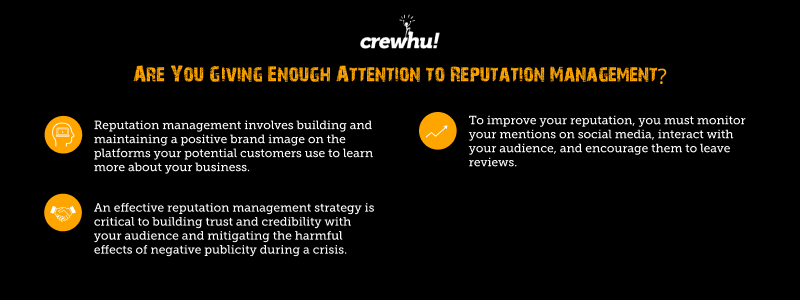Are You Giving Enough Attention to Reputation Management?


Your reputation influences the purchasing decisions of many customers. A few years ago, businesses mainly depended on word-of-mouth referrals to build their image. Then, big brands with huge marketing budgets would sponsor TV and newspaper ads.
Today, the internet has revolutionized business and increased exposure to company profiles. Your reputation and brand image largely depend on how people perceive you based on search engine results, social media, and online review sites. Unfortunately, many businesses don’t give enough attention to their reputation until they get caught up in a public crisis.
An effective online reputation management strategy seeks to build a positive brand image before a crisis happens. It involves identifying the online platforms prospective customers use to learn more about your product or service, then taking actionable steps to ensure that the platforms portray your business positively.
Why online reputation management is important
Online reputation management (ORM) is critical to businesses because it enables them to monitor how their audiences perceive them regularly. Since your online content changes continuously and you interact with diverse clients with varying experiences, how people perceive your brand can shift drastically instantly. Here is how ORM can help you manage customer perceptions:
It mitigates the impact of PR crises and negative reviews
Negative publicity and loss of public confidence can be detrimental to your brand image and revenue. For instance, in 2017, United Airlines lost more than $1 billion in market value after a passenger was dragged off an overbooked plane. Other passengers recorded the video, which soon went viral with more than 210 million views.
Of course, not all crises are that dramatic. Unsatisfied customers may leave negative reviews on your social media pages or, worse, on third-party review platforms, where you have no control. Regardless of the form it takes, negative press can harm your brand.
Reputation management mitigates the effects of these crises by showing your business in the best possible light. An effective reputation management plan will protect your organization’s image, provide a structured way to respond to negative press, and enable you to rebuild trust in your brand.
It builds trust and credibility
Online reviews build trust with your audience. According to research by Brand Rated, 95% of consumers read online reviews before buying a product, and 49% trust them as much as they trust personal recommendations from family and friends.
If potential customers know that others have had positive experiences with your brand, they will be more likely to trust you and be confident that they can rely on you to deliver what you promise. Credibility in business attracts customers, clients, and investors. They can vouch for you, recommend you, and continue using your company.
However, not all reviews will be positive, and the negative comments can undermine your trust-building efforts. When you give enough attention to reputation management, you’ll be able to leverage different situations to build trust and credibility for your business.
It attracts quality talent in the job market
Your organization’s positive exposure helps build reputation and credibility, which makes it an attractive destination for top talent in the market. When considering whether to work for you, a candidate’s perception of your company can significantly influence their decision. How your customers perceive you matters, but what your employees say about you is equally important – especially for hard-to-fill senior positions.
Employees can leave company reviews anonymously on sites like Glassdoor, where candidates can learn about the company’s expectations, culture, and work environment. Thoughtful oversight and management of your company’s reputation can make your organization a priority for quality and productive employees. A quality workforce gives you a competitive advantage and better performance.
Reputation management snapshot:
- 80% of consumers are likely or highly likely to leave a review of their original negative experience that was resolved and turned into a positive one
- 86% of people hesitate to buy from a business with negative reviews
- 50% of job candidates say they wouldn't work for a company with a bad reputation even if offered a pay raise
- A one-star rating increase on Yelp results in a 5–9% increase in business revenue, while one negative review can make you lose 30 customers
- In the past year, 99% of consumers have used the internet to learn more about local businesses
Three tips for improving online reputation management
The importance of improving and managing your online reputation is obvious. But how do you achieve this, and where do you begin? Here are some tips to get you started on the right track to make sure your reputation remains stellar:
1. Monitor reviews and social mentions
Track reviews on all relevant platforms, including industry-related sites like TripAdvisor or HomeAdvisor, and general sites like Google Reviews and Yelp. Also, monitor any social mentions on Facebook, Instagram, and Twitter. If someone tags you in a Tweet, see what it’s about and respond. Reacting almost instantly will help you stop negative publicity before it goes viral, while positive mentions can turn undecided potential customers into actual buyers.
Use social listening tools, such as Hootsuite, Google Alerts, and Sprout Social, with your brand name as the keyword to track mentions of your business.
2. Update your profiles
Having brand profiles isn’t enough. You must update and maintain them regularly on your website, blogs, social media accounts, and business accounts on third-party review sites. You will gain an organic following, increase your engagement, and make it easier for people to reach you whenever they have a concern if you keep everything up-to-date.
3. Interact on social media
Connecting with your social media followers makes them feel important and increases engagement. When they feel that you care about them, they are more likely to share their experience doing business with you and spread positive information about your business.
When you interact, you’ll also reach a larger audience and get valuable feedback you can use to improve your brand image. Also, encourage your customers to leave reviews when they do business with you.
The tips and tricks outlined in this guide provide a thorough understanding of why ORM matters and offer up some ideas on areas you should focus on. Even better, though, is that you don’t have to try to tackle all of this on your own!
Improve your online reputation management with Crewhu
You shouldn’t leave your reputation to people who hardly know you. Instead, help your audience, and potential customers get to know you in the best light possible. Crewhu will take your ORM to the next level by promoting how trustworthy you are through:
- Showcasing your customer satisfaction score (CSAT) on your site
- Sharing reviews online
- Showcasing real-time client feedback with the website testimonials widget
- Encouraging clients to share their unique experiences
Our customer satisfaction platform is designed to ensure you provide outstanding customer interactions and improve your online reputation. Book a Crewhu demo today and see how we make it easy to build your brand image.






